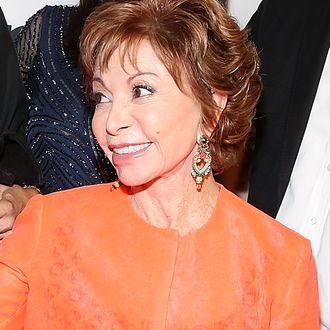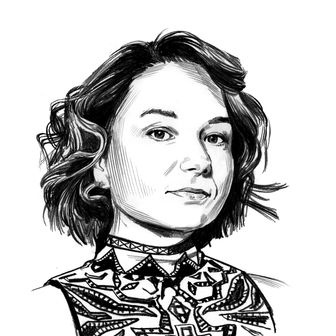
On Wednesday night Isabel Allende became the first Spanish-language author to be honored with the Lifetime Achievement Award for Distinguished Contribution to American Letters at the National Book Awards. And an obvious highlight of the night was her acceptance speech, which bounced effortlessly from bawdy, self-deprecating humor to heart-wrenching truths about the function of writing as an art in our current political age. She began by accepting the award “on behalf of millions of people like myself who have come to this country in search of a new life” and continued on to earn a standing ovation from the audience. You can read her speech in its entirety below:
Do you have an encyclopedia or a telephone book so that I can stand on something?
Well thank you, thank you so much for this unexpected honor that I accept humbly, on behalf of millions of people like myself who have come to this country in search of a new life.
I have always been a foreigner, I was born in Peru and raised in Chile in my grandfather’s house.
I followed my stepfather in his travels as a diplomat. I was a political refugee for 13 years in Venezuela after the military coup of 1973 that ended a long tradition of democracy in Chile. And I have been an immigrant in the United States for more than 30 years.
Being chronically uprooted has some advantages. Most of my writing comes from nostalgia, loss, and separation, from an incurable desire to belong in a place. I look Chilean and I dream, cook, make love, and write in Spanish. Make love: it would be ridiculous panting in English. My lover doesn’t speak a word of Spanish. I have a lover at 76, you wouldn’t believe, yeah. He’s a brave man.
As a stranger, I don’t take anything for granted. I observe and listen carefully. I ask questions and I question everything. For my writing I don’t need to invent much, I look around and take notes, I’m a collector of experiences. I draw on other people’s lives, especially the strong and passionate women that I meet everywhere. I draw on the sorrow and the struggles of every day, on the joy of being alive and not afraid of death. I’m not afraid of life either. I refuse to live in fear and let alone to vote in fear.
This is a dark time my friends, it’s a time of war in many places, and potential war everywhere. A time of nationalism and racism, of cruelty and fanaticism, a time where the values and principles that sustain our civilization are under siege. It’s a time of violence and poverty for many. Masses of people who are forced to leave everything that is familiar to them and undertake dangerous journeys to save their lives.
Remember the little 3-year-old Syrian boy whose body the ocean washed up onto a beach in Turkey in 2015? His name was Alan Kurdi. He could have been your son or my grandson. That same day, his father also lost his wife and another child in the inflatable boat that took them across the sea as they escaped the war in Syria. Alan Kurdi symbolized the plight of millions of desperate people. For an instant the world was shaken by the image of the dead toddler on the beach, but the world quickly forgot.
I write to preserve memory against the erosion of oblivion and to bring people together. I believe in the power of stories. If we listen to another person’s story, if we tell our own story, we start to heal from division and hatred. Because we realize that the similarities that bring us together are many more than the differences that separate us.
I also write to understand. What is writing after all but an attempt to sort out the confusion of life. Often I don’t know why I feel compelled to write a certain story and it is only later that I find out that it is connected to some part of my life, or my psyche, that I needed to understand and sometimes to heal.
For those without roots in a place, memory is essential to maintain a sense of continuity. Nobody witnesses the length of our lives, we need to remember. And what would a writer do without an acute sense of the past, without an obsession with memory? I don’t know how much of my memory is actual fact and how much I have invented. Maybe I remember what never happened. Memory is subjective, it is conditioned by emotion and belief. Our own story is also subjective. We choose what to highlight and what to ignore or forget. We select the adjectives to describe our journey and in doing so we create our own legend. I have created for myself the bigger than life legend, probably to compensate for my short stature.
In this land, everybody descends from someone who came from another place. The only difference between you and me, unless there’s a Native American person in the audience, is that your grandparents got here first. I am just part of this massive diaspora, and although I’m critical of many things about this country, I am proud to be an American citizen.
I have received much more than I ever dreamed of, and I have been offered the opportunity to give something back. This national award is an extraordinary gift for me, it means that maybe I’m not an alien after all. It means that maybe it’s time to plant my roots and relax. Maybe I have found a place where I can belong. Maybe I’m not going anywhere anymore.


